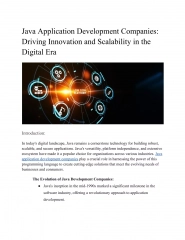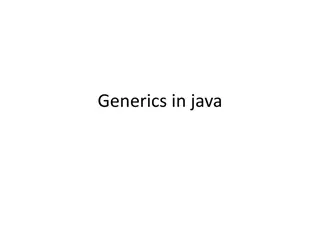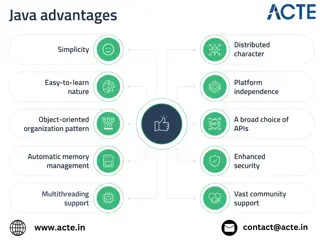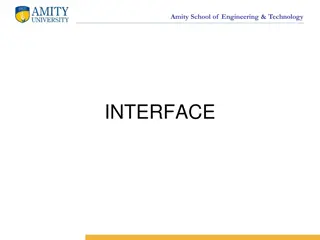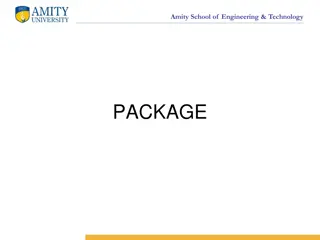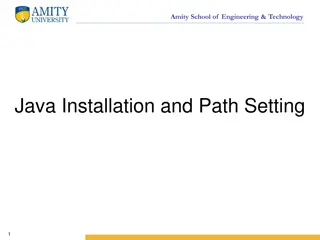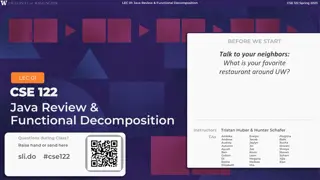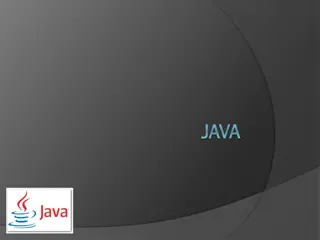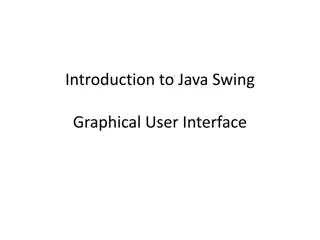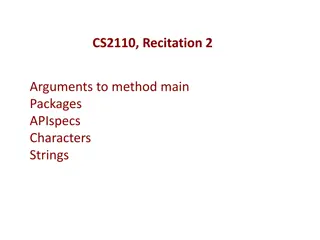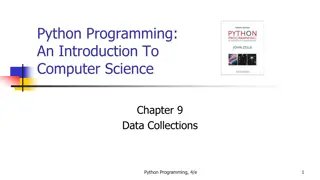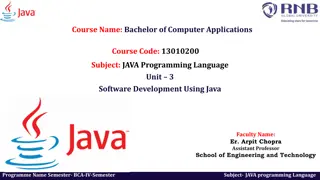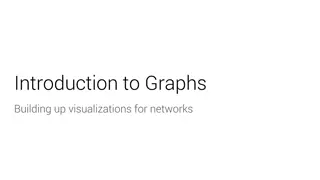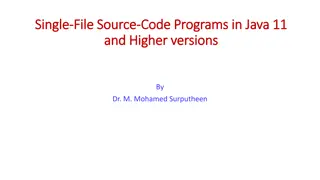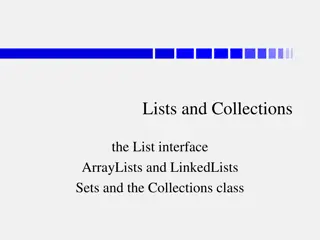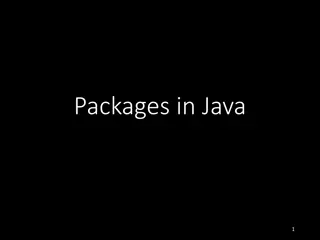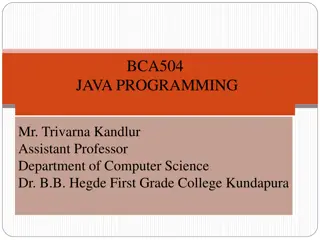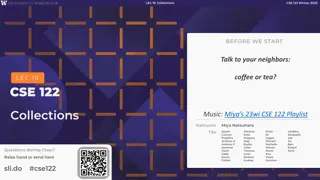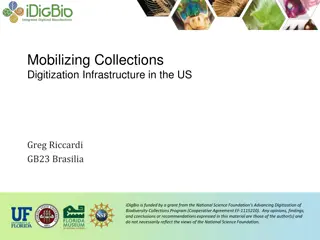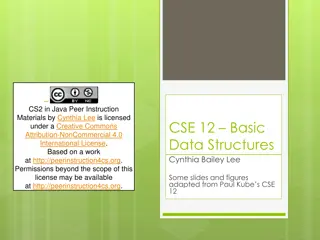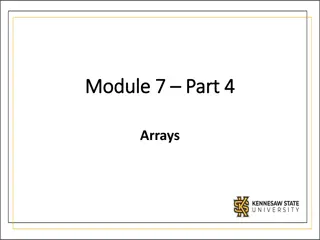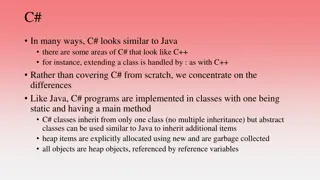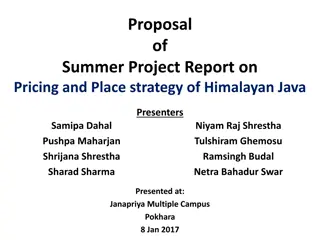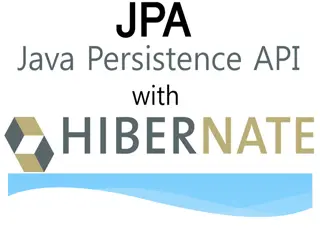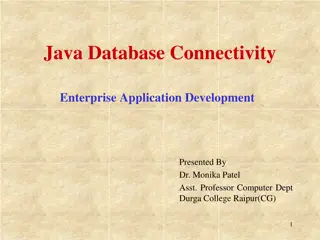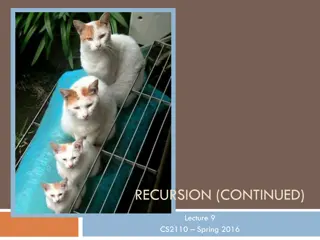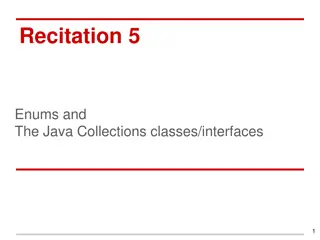Java application development company (1)
In today's digital landscape, Java remains a cornerstone technology for building robust, scalable, and secure applications. Java's versatility, platform independence, and extensive ecosystem have made it a popular choice for organizations across various industries. Java application development compa
2 views • 4 slides
Efficient Collections and Late Fee Assessment Procedures
Learn step-by-step procedures for collections and late fee assessment, including sorting, data manipulation in Excel, secure shell operations, file management, and mail merge for communication. Increase efficiency and accuracy in managing late fees and collections with detailed instructions provided
0 views • 11 slides
Efficient Searching Across Research4Life Collections
Learn how to efficiently search and access resources within Research4Life collections using tools like Summon and Google Scholar. Explore content portals, refine search results, and customize citations for your research needs. Enhance your searching skills to make the most out of the available resou
3 views • 51 slides
NCI Data Collections BARPA & BARRA2 Overview
NCI Data Collections BARPA & BARRA2 serve as critical enablers of big data science and analytics in Australia, offering a vast research collection of climate, weather, earth systems, environmental, satellite, and geophysics data. These collections include around 8PB of regional climate simulations a
6 views • 22 slides
Understanding Generics in Java
Generics in Java allow for parameterized types, enabling the use of different data types in classes, interfaces, and methods. By creating generic entities, such as classes that work with various data types, Java programmers can write more flexible and reusable code. This concept is demonstrated thro
0 views • 16 slides
Understanding Java: The Backbone of Cross-Platform Development
Java stands as a cornerstone in the realm of programming languages, revered for its versatility and robustness. Enrolling in a Java Course in Pune significantly enhances one\u2019s ability to leverage Java\u2019s capabilities effectively. Understandi
1 views • 1 slides
Understanding Java Interfaces in Amity School of Engineering & Technology
Java interfaces are a key concept in object-oriented programming that allows for achieving multiple inheritance. The article discusses how Java interfaces work, their role in defining class behavior, and the differences between interfaces and classes. It also explains the syntax for declaring interf
2 views • 48 slides
Understanding Java Packages and Their Importance in Programming
An exploration of Java packages, their role in structuring code, organizing classes, and enhancing code reusability. Learn about built-in and user-defined packages, the Java API's package organization, and the different types of packages available in Java programming. Discover how packages help in c
2 views • 18 slides
Amity School of Engineering & Technology Java Installation Guide
In this detailed guide provided by Amity School of Engineering & Technology, learn how to install and set up Java on your system effectively. The step-by-step instructions cover downloading the Java installer, configuring the installation wizard, setting environmental variables, and more to ensure a
1 views • 19 slides
Java Review & Functional Decomposition in CSE 122 Spring 2023
Lecture 01 in CSE 122 covers Java review, functional decomposition, and code quality. Announcements include a Java review session, programming assignments, and reminders on Java syntax. The session encourages active participation through in-class activities using Slido polls. Students are also urged
0 views • 24 slides
Understanding Interactive Programs and Input/Output in Java
Interactive programs in Java allow users to input data through the console, which can be captured and used in the program. This involves using the Scanner class to read user input, and understanding common Scanner methods to process different types of input. Importing Java class libraries is essenti
2 views • 15 slides
Understanding Priority Queues and Heaps in Java Collections
Explore the concepts of priority queues, heaps, and related data structures in Java Collections Framework. Learn about the Priority Queue class, Entry ADT, Comparator ADT, and Total Order Relations, along with their practical applications in process scheduling and more.
0 views • 44 slides
Learning Swing with Java Foundation Classes (JFC) and Swing
Java Foundation Classes (JFC) and Swing provide a powerful set of tools for building graphical user interfaces in Java applications. This includes Swing GUI components, pluggable look-and-feel support, accessibility APIs, Java 2D graphics, and internationalization capabilities. By learning Swing wit
1 views • 11 slides
Understanding Java Swing for Building Graphical User Interfaces
Java Swing is a powerful framework for creating graphical user interface applications in Java. It provides a wide array of visual components such as JFrame, JComponent, and JPanel, enabling developers to build interactive and visually appealing applications easily. With Swing, developers can design
1 views • 25 slides
Java Application Development Basics
Learn how to create a Java application with a main method using Eclipse. Understand the concept of method parameters and how to provide arguments when running the application through Eclipse's Run Configurations feature. Explore the structure of packages in Java and the Java API.
0 views • 26 slides
Introduction to Data Collections in Python Programming
In this introduction to computer science chapter, you will explore the use of lists, tuples, and dictionaries in Python to represent and manipulate collections of data. Learn about the functions and methods available for working with Python lists and understand how to group related values using tupl
0 views • 58 slides
Understanding Java Programming: BCA IV Semester Course Overview
This Bachelor of Computer Applications (BCA) course focuses on Java programming language fundamentals, object-oriented concepts, software development principles, and practical application skills. Students will learn to define Java program features, implement object-oriented features, work with array
0 views • 31 slides
Exploring Graphs: Visualizations and Representations in Java
Delve into the world of graphs with a focus on visualizations for networks and building up graph representations in Java. Explore different graph representations, adjacency lists, and key-value mappings, along with insights on storing and tracking data efficiently using Java data structures. Dive in
0 views • 12 slides
Understanding Single-File Source Code Programs in Java 11
Explore the concept of single-file source code programs in Java 11, where the entire program is contained within a single .java file without external dependencies. Learn how to compile and run these programs both before and after Java 11, and discover the new feature of executing Java programs direc
0 views • 11 slides
Understanding Scanner Class in Java: Reading User Input and Processing Files
The Scanner class in Java's java.util package allows reading input from the keyboard or files. It looks for tokens in the input, reads different types of values, and has methods like nextInt() and nextLine(). You can also read from files by creating a File object. Learn how to use Scanner to interac
0 views • 21 slides
Understanding Lists and Collections in Java
Discover how to utilize the List interface, ArrayLists, and LinkedLists in Java to efficiently store, manipulate, and iterate over collections of data. Learn the fundamental operations such as adding, getting, changing, and removing elements from a list, as well as exploring different methods provid
0 views • 55 slides
Library Collaboration in Maine: A Shared Collections Strategy
Library collaboration in Maine involves academic, public, and special libraries working together through the Maine Shared Collections Strategy (MSCS) project. Led by Dr. Clem Guthro of Colby College Libraries, the project aims to manage legacy print collections efficiently across various institution
0 views • 18 slides
Understanding Packages in Java: A Comprehensive Overview
Packages in Java play a crucial role in organizing and structuring code for efficient reuse and maintenance. They allow you to group related classes together, provide encapsulation, and facilitate code organization. This article dives into the basics of Java packages, advantages they offer, differen
0 views • 19 slides
Introduction to Java Programming: Basics and Applications
Java, developed by James Gosling, is a versatile object-oriented programming language used for mobile, desktop, web applications, servers, games, and more. It is renowned for its platform independence, popularity, ease of use, security, and strong community support. This subject delves into Java fun
0 views • 15 slides
Understanding Optional Class in Java Collections
The Optional class in Java is a powerful tool used to handle scenarios where a value may or may not be present. It provides methods like isPresent(), isEmpty(), and get() to work with potentially absent values. Optional.of() and Optional.empty() are key methods to create instances of Optional object
0 views • 18 slides
Java Overview and Basics: Understanding the Fundamentals of Java Programming
Java is a versatile programming language known for its simplicity, security, portability, and high performance. Its history dates back to 1990 when the concept was first suggested, leading to the creation of Java in 1995 by James Gosling. Over the years, Java has evolved with various versions introd
0 views • 65 slides
Advancing Biodiversity Collections Digitization in the US
This material highlights the efforts and initiatives of the National Science Foundation's Advancing Digitization of Biodiversity Collections Program, focusing on digitizing and aggregating biological and paleontological records. The goal is to mobilize collections digitization infrastructure, develo
0 views • 11 slides
Overview of Java Programming Language
Java is a versatile and powerful programming language created by James Gosling and others at Sun Microsystems in the 1990s. It aims for portability, reliability, safety, simplicity, and efficiency. With a strong focus on object-oriented programming, Java has evolved over the years with a rich histor
0 views • 33 slides
Peer Instruction in Java: Enhancing Learning Experience
Explore the world of data structures through peer instruction in Java with Cynthia Lee. This approach involves interactive group discussions, problem-solving, and hands-on activities to deepen understanding of key concepts. The course covers topics such as ADTs, APIs, algorithm analysis, object-orie
0 views • 23 slides
Understanding Java Collections Framework
Dive into the world of Java Collections Framework with a comprehensive overview of interfaces, implementations, algorithms, online resources, and examples. Explore the concepts of autoboxing, wrapper classes, and collection manipulation through practical scenarios.
0 views • 36 slides
Mastering Generics in Effective Java: A Practical Guide for Java Programmers
Explore the world of generics in Java through Joshua Bloch's guidance in "Effective Java". Learn the importance of avoiding raw types, leveraging parameterized types for type safety, handling mixing of generic and raw types, and implementing wildcards for flexible and typesafe coding. Enhance your J
0 views • 30 slides
Understanding Arrays in Java: Basics and Operations
Java arrays are fixed-size collections that can only hold a single data type. They require manual checking for elements and cannot be sliced like Python lists. Operations such as resizing, searching, printing, comparing, and slicing arrays need to be done manually. Remember, the array size must be d
0 views • 14 slides
Differences Between C# and Java: A Comparative Overview
C# and Java share similarities in syntax and features, but there are key distinctions that set them apart. From class inheritance to memory management, this comparison highlights the unique aspects of C# programming. Explore how C# diverges from Java in terms of multiple inheritance, explicit heap a
0 views • 16 slides
Study on Pricing and Place Strategy of Himalayan Java Coffee: A Detailed Analysis
This report delves into the pricing and place strategies of Himalayan Java coffee, focusing on factors influencing coffee pricing and selection of outlet locations. The study aims to identify the target market, understand competitive dynamics, and analyze factors impacting coffee sales at Himalayan
0 views • 10 slides
Understanding Java Persistence API (JPA) for Data Management in Java Applications
Java Persistence API (JPA) is a specification that provides a framework for managing relational data in Java applications. It simplifies ORM solutions, offers vendor independence, and supports test-driven development with annotation-driven mapping.
0 views • 31 slides
Introduction to Java Database Connectivity (JDBC) in Enterprise Application Development
JDBC, or Java Database Connectivity, is a vital technology in enterprise application development that provides a standardized library for Java programs to connect to databases via SQL commands. It abstracts vendor-specific details, making connectivity to multiple databases seamless. JDBC API standar
0 views • 13 slides
Understanding Recursion in Java: CS2110 Lecture Overview
This content delves into the concept of recursion in the context of Java programming as discussed in the CS2110 Spring 2016 lecture series. It covers the basics of recursion, including base cases and how Java stack frames operate. The material also includes solutions to exception-handling problems a
0 views • 21 slides
Exception Handling in Java: Understanding Errors and Exceptions
Exception handling in Java is crucial for dealing with errors and exceptions that can occur during program execution. Errors and exceptions are conditions that disrupt the normal flow of a program, and understanding their differences is key to effective error management. This chapter covers the conc
0 views • 32 slides
Understanding Enums and Java Collections
Explore the concept of enums in Java programming, representing sets of constant values like suits, directions, days of the week, and planets. Learn about different ways to implement enums, their features, and how to use them effectively in your programs. Discover the advantages of enums over using c
0 views • 22 slides
Leveraging Java Collections Framework - ArrayList & LinkedList Methods
Delve into the essential methods of the List
0 views • 22 slides
